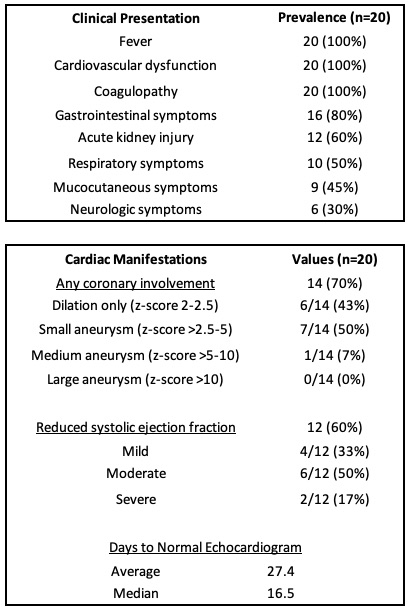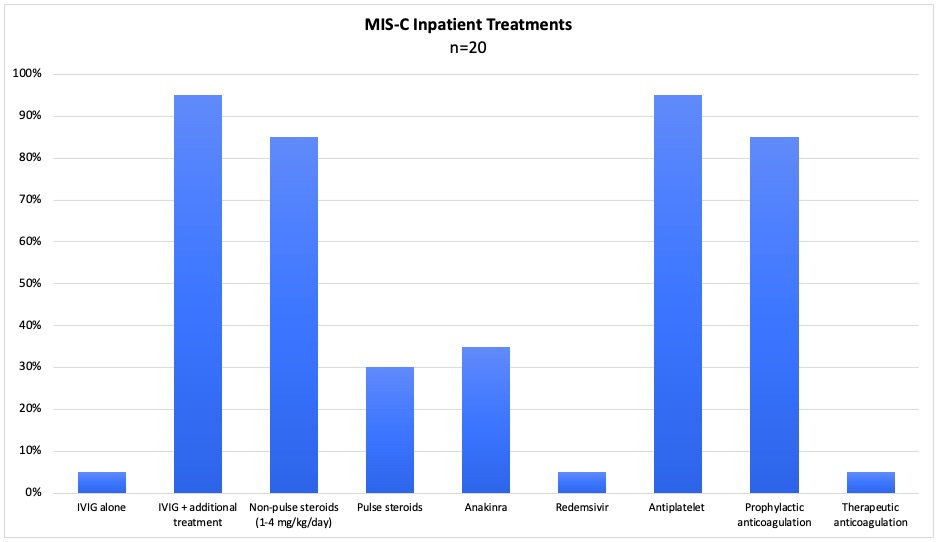Session Information
Date: Tuesday, November 9, 2021
Title: Pediatric Rheumatology – Clinical Poster III: Miscellaneous Rheumatic Disease (1614–1644)
Session Type: Poster Session D
Session Time: 8:30AM-10:30AM
Background/Purpose: Multisystem Inflammatory Syndrome in Children (MIS-C) is a recently defined post-infectious phenomena associated with coronavirus disease 2019 (COVID-19). We assessed the demographics, clinical characteristics, hospital course, and short-term outcomes of patients admitted with MIS-C.
Methods: We performed a retrospective analysis of patients who met the World Health Organization definition of MIS-C and were admitted to Duke Children’s Hospital from August 3, 2020 to March 25, 2021. Demographic and clinical data were collected from the electronic medical record. Associations between admission lab values and hospital length of stay (LOS) were examined using univariate and multivariate linear regression after log transformation for variables with skewed distribution.
Results: Twenty patients were included. The mean (±SD) age was 9.5 (5.4) years; 10 patients (50%) were male; 16 (80%) were Black. Twelve patients (60%) were previously healthy; the most common comorbidity was obesity in 8 (40%) children. All patients presented with fever, cardiovascular dysfunction, and coagulopathy. Other common manifestations were gastrointestinal distress (80%), acute kidney injury (60%), respiratory compromise (50%), and mucocutaneous symptoms (45%). Echocardiographic abnormalities were noted in 18 (90%) patients, with coronary artery changes in 14 (70%) and reduced systolic ejection fraction in 12 (60%) (Figure 1). Intensive care unit admission, ionotropic support, and mechanical ventilation were indicated in 80%, 70%, and 20% of patients, respectively. All patients were treated with intravenous immunoglobulin (IVIG), with 19 (95%) requiring additional treatment: 17 (85%) with 1-4 mg/kg/day intravenous glucocorticoids, 6 (30%) with pulse dose glucocorticoids, and 7 (35%) with anakinra (Figure 2). Treatment complications included IVIG-associated hemolytic anemia (10%) and steroid-related adverse effects such as hypertension, bradycardia, hyperglycemia, and delirium (35% collectively). All patients survived and were discharged home. Median (IQR) LOS was 8 (7, 11) days. All echocardiograms normalized in a median (IQR) of 16.5 (3, 41) days. Univariate analyses of admission lab values and LOS revealed a positive association between ferritin (p=.004) and a negative association between Hgb (p=.036) and albumin (p=.001). Controlling for all significant variables in a multivariate linear regression model, ferritin (adjusted p=.043) and albumin (adjusted p=.017) remained significantly associated with LOS (adjusted R2=.59).
Conclusion: MIS-C is a novel entity of high morbidity and low mortality in children previously infected with COVID-19. In this case series, children with MIS-C presented with fever and multiorgan failure, with cardiovascular compromise being most common. Higher baseline ferritin level and lower serum albumin were associated with longer LOS. Treatment with IVIG, glucocorticoids, and anakinra resulted in favorable short-term outcomes.
 Figure 1. Clinical presentations and cardiac manifestations of MIS-C patients admitted to Duke Children’s Hospital.
Figure 1. Clinical presentations and cardiac manifestations of MIS-C patients admitted to Duke Children’s Hospital.
 Figure 2. Therapies received by admitted MIS-C patients at Duke Children’s Hospital.
Figure 2. Therapies received by admitted MIS-C patients at Duke Children’s Hospital.
To cite this abstract in AMA style:
Covert L, Becker M, Sadun R, Van Mater H. Multisystem Inflammatory Syndrome in Children: Clinical Characteristics and Predictors for Length of Hospitalization [abstract]. Arthritis Rheumatol. 2021; 73 (suppl 9). https://acrabstracts.org/abstract/multisystem-inflammatory-syndrome-in-children-clinical-characteristics-and-predictors-for-length-of-hospitalization/. Accessed .« Back to ACR Convergence 2021
ACR Meeting Abstracts - https://acrabstracts.org/abstract/multisystem-inflammatory-syndrome-in-children-clinical-characteristics-and-predictors-for-length-of-hospitalization/
